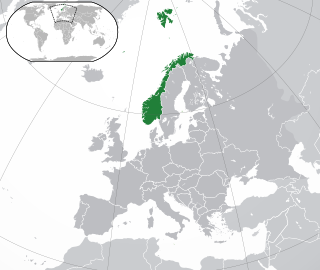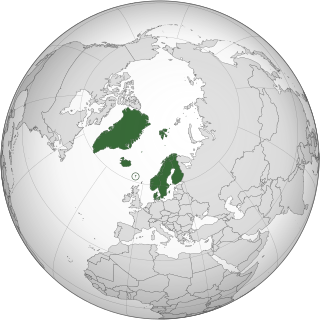
Lesbian, gay, bisexual, transgender and queer (LGBTQ) movements are social movements that advocate for LGBTQ people in society. Although there is not a primary or an overarching central organization that represents all LGBTQ people and their interests, numerous LGBT rights organizations are active worldwide. The first organization to promote LGBT rights was the Scientific-Humanitarian Committee, founded in 1897 in Berlin.

The Nordic Council is the official body for formal inter-parliamentary Nordic cooperation among the Nordic countries. Formed in 1952, it has 87 representatives from Denmark, Finland, Iceland, Norway, and Sweden as well as from the autonomous areas of the Faroe Islands, Greenland, and Åland. The representatives are members of parliament in their respective countries or areas and are elected by those parliaments. The Council holds ordinary sessions each year in October/November and usually one extra session per year with a specific theme. The council's official languages are Danish, Finnish, Icelandic, Norwegian, and Swedish, though it uses only the mutually intelligible Scandinavian languages—Danish, Norwegian, and Swedish—as its working languages. These three comprise the first language of around 80% of the region's population and are learned as a second or foreign language by the remaining 20%.

The northern region of Europe has several definitions. A restrictive definition may describe northern Europe as being roughly north of the southern coast of the Baltic Sea, which is about 54°N, or may be based on other geographical factors such as climate and ecology.
Nordic folk music includes a number of traditions of Nordic countries, especially Scandinavian. The Nordic countries are Iceland, Norway, Sweden, Denmark and Finland.
The Norwegian Organisation for Sexual and Gender Diversity is the oldest, largest and preeminent Norwegian member organization representing the interests of gay, lesbian, bisexual, transgender and intersex persons in Norway.

Lesbian, gay, bisexual, and transgender (LGBTQ) rights in Iceland rank among the highest in the world. Icelandic culture is generally tolerant towards homosexuality and transgender individuals, and Reykjavík has a visible LGBT community. Iceland ranked first on the Equaldex Equality Index in 2023, and second after Malta according to ILGA-Europe's 2024 LGBT rights ranking, indicating it is one of the safest nations for LGBT people in Europe. Conversion therapy in Iceland has been illegal since 2023.

Lesbian, gay, bisexual, and transgender (LGBTQ) people in Norway have the same legal rights as non-LGBT people. In 1981, Norway became one of the first countries in the world to enact an anti-discrimination law explicitly including sexual orientation. Same-sex marriage, adoption, and assisted insemination treatments for lesbian couples have been legal since 2009. In 2016, Norway became the fourth country in Europe to pass a law allowing the change of legal sex for transgender people based on self-determination. On 1 January 2024, conversion therapy became legally banned within Norway.

Lesbian, gay, bisexual, and transgender (LGBT) rights in the Faroe Islands are relatively similar to that of Denmark. The progress of LGBT rights has been slower, however. While same-sex sexual activity has been legal in the Faroe Islands since the 1930s, same-sex couples never had a right to a registered partnership. In April 2016, the Løgting passed legislation legalizing civil same-sex marriage on the Faroes, recognizing same-sex marriages established in Denmark and abroad and allowing same-sex adoption. This was ratified by the Folketing in April 2017. The law went into effect on 1 July 2017.
Samtökin '78, officially The National Queer Organisation in English, is the national queer organisation of Iceland and non-governmental organization dedicated to the interest and rights of LGBTQ people in Iceland. The organisation provides education about LGBTQIA+ related matters, counselling and legal consultation for queer people in addition to running a youth club for young people that identify as queer and hosting open houses once a week intended for queer people and their allies.
The Nordic agrarian parties, also referred to as Scandinavian agrarian parties or agrarian liberal parties, are agrarian political parties that belong to a political tradition particular to the Nordic countries. Positioning themselves in the centre of the political spectrum, but fulfilling roles distinctive to Nordic countries, they remain hard to classify by conventional political ideology.

Foreningen Norden, Föreningen Norden (Swedish), Norræna félagið (Icelandic), Norrøna Felagið (Faroese), Peqatigiiffik Nunat Avannarliit (Greenlandic) and Pohjola-Norden (Finnish), The Norden Associations, sometimes referred to as The Nordic Associations are non-governmental organisations in the Nordic countries promoting civil cooperation between the Nordic countries. Established since 1919, there are Norden Associations in Sweden, Norway, Denmark, Finland, Iceland, Greenland, the Faroe Islands and Åland. Since 1965 these national branches are grouped in an umbrella organisation Foreningene Nordens Forbund (FNF), The Confederation of Norden Associations. The co-operation between the Nordic countries include projects such as Nordjobb, Nordic Library Week and Norden at the Cinema.

The Nordic countries are a geographical and cultural region in Northern Europe and the North Atlantic. It includes the sovereign states of Denmark, Finland, Iceland, Norway and Sweden; the autonomous territories of the Faroe Islands and Greenland; and the autonomous region of Åland.

The Nordic Quizzing Championships is a bi-annual quiz event in the Nordic and Baltic countries. Top quizzers from Denmark, Sweden, Norway, Finland, Iceland, Faroe Islands, Greenland, Åland, Estonia, Latvia, and Lithuania are invited.

The following outline offers an overview and guide to LGBTQ topics:

The Baltic Sea Parliamentary Conference (BSPC) was established in 1991 as a forum for political dialogue between parliamentarians from the Baltic Sea Region. BSPC aims at raising awareness and opinion on issues of current political interest and relevance for the Baltic Sea Region. It promotes and drives various initiatives and efforts to support a sustainable environmental, social and economic development of the Baltic Sea Region. It strives at enhancing the visibility of the Baltic Sea Region and its issues in a wider European context.

The Nordic regional group of ENTSO-E is a synchronous electrical grid composed of the electricity grids of Norway, Sweden, Finland and the eastern part of electricity sector in Denmark. The grid is not synchronized with the synchronous grid of Continental Europe, but has a number of non-synchronous DC connections with that as well as other synchronous grids. Gotland is not synchronized with the Swedish mainland either, as it is connected by HVDC.
The North European Women's Volleyball Club Championship is a volleyball championship for clubs from the Nordic countries. It was established in 2007 and is organised by the North European Volleyball Zonal Association (NEVZA). In addition to the Nordic countries other neighbouring countries may be invited such as Estonia, Lithuania, Latvia and the United Kingdom.













